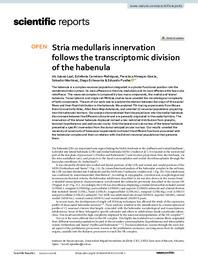Por favor, use este identificador para citar o enlazar este ítem:
https://hdl.handle.net/11000/34374
Stria medullaris innervation follows the transcriptomic division of the habenula
Título :
Stria medullaris innervation follows the transcriptomic division of the habenula |
Autor :
Juárez Leal, Iris 
Carretero Rodríguez, Estefanía 
Almagro-García, Francisca
Martínez, Salvador
Echevarría, Diego
Puelles, Eduardo |
Editor :
Nature |
Departamento:
Departamentos de la UMH::Patología y Cirugía
Departamentos de la UMH::Histología y Anatomía |
Fecha de publicación:
2022-06-16 |
URI :
https://hdl.handle.net/11000/34374 |
Resumen :
The habenula is a complex neuronal population integrated in a pivotal functional position into the
vertebrate limbic system. Its main afference is the stria medullaris and its main efference the fasciculus
retroflexus. This neuronal complex is composed by two main components, the medial and lateral
habenula. Transcriptomic and single cell RNAseq studies have unveiled the morphological complexity
of both components. The aim of our work was to analyze the relation between the origin of the axonal
fibers and their final distribution in the habenula. We analyzed 754 tracing experiments from Mouse
Brain Connectivity Atlas, Allen Brain Map databases, and selected 12 neuronal populations projecting
into the habenular territory. Our analysis demonstrated that the projections into the medial habenula
discriminate between the different subnuclei and are generally originated in the septal territory. The
innervation of the lateral habenula displayed instead a less restricted distribution from preoptic,
terminal hypothalamic and peduncular nuclei. Only the lateral oval subnucleus of the lateral habenula
presented a specific innervation from the dorsal entopeduncular nucleus. Our results unveiled the
necessity of novel sorts of behavioral experiments to dissect the different functions associated with
the habenular complex and their correlation with the distinct neuronal populations that generate
them.
|
Tipo de documento :
info:eu-repo/semantics/article |
Derechos de acceso:
info:eu-repo/semantics/openAccess |
DOI :
https://doi.org/10.1038/s41598-022-14328-1 |
Publicado en:
Sci Rep . 2022 Jun 16;12(1):10118 |
Aparece en las colecciones:
Artículos Histología y Anatomía
|
 La licencia se describe como: Atribución-NonComercial-NoDerivada 4.0 Internacional.
La licencia se describe como: Atribución-NonComercial-NoDerivada 4.0 Internacional.

 La licencia se describe como: Atribución-NonComercial-NoDerivada 4.0 Internacional.
La licencia se describe como: Atribución-NonComercial-NoDerivada 4.0 Internacional.
.png)